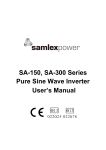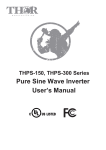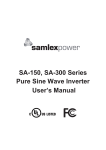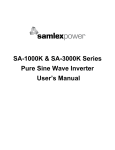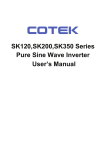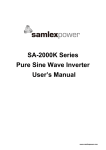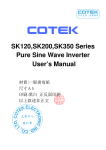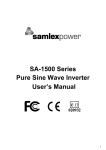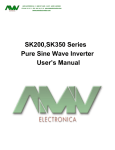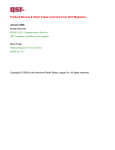Download Samlex® SA Series Pure Sine Wave Inverter Guide
Transcript
SA-150, SA-300 Series Pure Sine Wave Inverter User’s Manual 1. Important Safety Information WARNING! Before installing and using the Inverter, you need to read following safety information carefully. 1-1. General Safety Precautions 1-1-1. Do not expose the Inverter to water, mist, snow, or dust. To reduce the risk of hazard, do not cover or obstruct the ventilation shaft. Do not install the Inverter in a zero-clearance compartment. Overheating may occur. 1-1-2. To avoid the risk of fire and electronic shock, make sure that existing wiring is in good electrical condition and not undersize. Do not operate the Inverter with damaged or substandard Wiring. 1-1-3. There are some components in the inverter can cause arcs and sparks. To prevent from fire or explosion, do not put batteries, flammable materials, or anything should be ignition–protected around the inverter. 1-2. Precautions When Working with Batteries 1-2-1. If battery acid contacts your skin or clothing, you need to wash it out immediately with soap and water. If acid enters into your eyes, immediately flush your eyes with running cold water for at least 20 minutes and get medical attention immediately. 1-2-2. Never smoke or make a spark or flame in the vicinity of batteries or Engines. 1-2-3. Do not drop a metal tools on the battery. The resulting spark or shortcircuit on the battery or other electrical parts may cause an explosion. 1-2-4. Remove personal metal items such as rings, bracelets, necklaces, and watches when working with a lead-acid battery, A lead-acid battery may produce a short-circuit current who’s temperature is high enough to weld these metal items and cause a severe burn. 2. Features 2-1. Electrical Performance 150W Model No. Specification Item SA-150-112 SA-150-124 Continuous Output Power 150W Surge Rating 200W Input voltage 12V 24V Input voltage Range 10.5 – 15.0 21.0 – 30.0 Output Voltage 110VAC ±5% Frequency 50 / 60Hz ±0.3% Max. Efficiency 87% 88% No Load Current Draw <0.3A Output Waveform Pure Sine Wave ( THD 6.0% Typical ) Power Factor Allowed cosθ-90° ~ cosθ+90° Protection Remote Control Safety Certification Overload, Short Circuit, Reverse Polarity (Fuse), Over / Under Input Voltage, Over Temperature. Yes, On/Off controlled by external switch UL458 EN60950-1 EN55022:1997 EMC FCC Class B EN61000-3-2:1998 EN61000-3-3:1995 EN55024:2001 Operating Temperature 0 – 40 ℃ Storage Temperature -30℃ to 70℃ Fan Cooling Thermostatically controlled Dimensions 200(L) x 132(w) x 72(H) mm / 7.87(L) x 5.20(W) x 2.83(H) Inch Weight 2.7 kg / 5.4 Lbs. Note: The specifications are subject to change without notice. 2-2. Electrical Performance 300W Model No. Specification Item SA-300-112 SA-300-124 Continuous Output Power 300W Surge Rating 400W Input voltage 12V 24V Input voltage Range 10.5 – 15.0 21.0 – 30.0 Output Voltage 110VAC ±5% Frequency 50 / 60Hz ±0.3% Max. Efficiency 89% 89% No Load Current Draw <0.35A Output Waveform Pure Sine Wave ( THD 6.0% Typical ) Power Factor Allowed cosθ-90° ~ cosθ+90° Protection Remote Control Safety Certification Overload, Short Circuit, Reverse Polarity (Fuse), Over / Under Input Voltage, Over Temperature. Yes, On/Off controlled by external switch UL458 EN60950-1 EN55022:1997 EMC FCC Class B EN61000-3-2:1998 EN61000-3-3:1995 EN55024:2001 Operating Temperature 0 – 40 ℃ Storage Temperature -30℃ to 70℃ Fan Cooling Thermostatically controlled Dimensions 237(L) x 155(w) x 72(H) mm / 9.33(L) x 6.10(W) x 2.83(H) Inch Weight 3.5 kg / 7.7 Lbs. Note: The specifications are subject to change without notice. PORT POWER STATUS REMOTE AC OUTPUT 150W 41.5 [1.63] PURE SINE WAVE INVERTER 105 [4.13] 188 [7.40] POWER ON OFF REMO. WARNING: REVERSE POLARITY WILL DAMAGE UNIT. NEG (-) POS(+) CHASSIS GROUND DC INPUT USE FEMALE ANDERSON PP75 CONNECTOR ONLY. 2-3. Mechanical Drawing Pure Sine Wave Inverter 2-4. Mechanical Drawing 300W ON OFF REMOTE AC OUTPUT REMOTE PORT POWER STATUS 3. Instructions SA-150 and SA-300 series are very reliable, portable, and fully protected. These pure sine inverters are used in a wide range of applications such as mobiles, office equipments, home entertainment, electronic appliances, etc. To get the most effective power inverter, it must be installed and used properly. Please read the instructions of this manual before you install and operate this model. 3-1. Front Panel Operations 3-1-1. ON / OFF REMOTE switch: Leave the switch in the down position (OFF) during installation. 3-1-2. LED display indicates Power Status LED Conditions Status Solid Green AC Power OK Fast Red Blink OVP Slow Red Blink UVP Intermittently Red Blink OTP Solid Red OLP 3-1-3. Remote Port:Place 0.75mm2 and Screw type cable between the remote port and the panel. 3-2. Rear Panel Operations 3-2-1. Ventilation shaft:Keep the ventilation shaft a distance (at least 3 inch) from anything surrounding it 3-2.2. Input terminals:Connect the input terminal to 12V / 24V battery or other 12V / 24V power source. 【+】represents positive, and【-】represents negative. Reverse polarity connection will blow the internal fuse and may damage inverter permanently. 3-2-3. Use wire # 8 AWG to connects Chassis ground with Vehicle Chassis. WARNING! Do not combine the 12V model with 24V battery or the unit will be destroyed immediately. Operate with the inverter without a proper ground connection may cause an electrical safety hazard. Damage caused by reversed polarity is not covered by the warranty. Ensure the power switch is in the OFF position before putting the battery in. 3-3. AC Safety Grounding: During AC wiring installation, AC input and output ground wires are connected to the inverter. The AC input ground wire must be connected to the incoming ground from AC utility source. The AC output ground wire should go to the grounding point for your loads ( for example, a distribution panel ground bus ). 3-3-1. Neutral Grounding (GFCI’S): 110V models:The neutral conductor of the AC output circuit of the Inverter is automatically connected to the safety ground during inverter operation. This conforms to National Electrical Code requirements that separately derived from AC sources (such as inverters and generators) which have their neutral conductors tied to ground in the same way as the neutral conductors from the utility tied to ground at the AC breaker panel. For models configured with a transfer relay, while AC utility power is present and the Inverter is in bypass mode, this connection (the neutral of the Inverter’s AC output to input safety ground) is not present so that the utility neutral is only connected to ground at your breaker panel, as required. Samlex has tested the following GFCIproperly when connected to the output of the Inverter. WARNING! Never connect the inverter’s output to the AC distribution grid, such as the household AC wall outlet. It will damage the Inverter. 3-4. Installation Before connecting your applications to the inverter, always check the power draw of your appliances. The inverter can supply surge power for a short time so as to start up the electrical equipment such as motors, pumps… that need more power while starting up. When all the above requirements are checked OK and satisfied and all connections are made, it’s time to turn on the inverter by switching the power to ‘ I ’ position. The sine wave filters provide sine wave output voltage when driven from AC outlet. To save the battery power, you are highly recommended to turn off the inverter when it is not used. DC input voltage status as follows: Model DC Input Over Voltage DC Input Under Voltage Shut-down Restart Shut-down Restart 12V models 15.3 14.3 10.5 12.7 24V models 30.6 28.6 21.0 25.2 3-5. DC Input (Outlet sockets available): CIGARETTE CLAMP STRIPPED WIRE POWER CLAW PP45 3-6. AC output (Outlet Sockets available): North America (GFCI) NEMA 5-15R Australia / New Zealand NEMA 5-20R Continental European United Kingdom Universal IEC-1 IEC-2 HARD WIRE 3-7. ON / OFF / REMOTE Main Switch. 3-7-1. Before installing the inverter, make sure the main switch must be “OFF”. 3-7-2. Before using the remote unit, make sure the main switch must be “ REMOTE”. 3-7-3. Ensure the remote control contact is off. 3-7-4. Remote Port:Place 0.75mm2 and Screw type cable between the remote port and the panel. 3-7-5. Remote port ON/OFF inverter setup status REMOTE PORT MODE Ⅰ MODE Ⅱ 4. Troubleshooting WARNING! Do not open or disassemble the Inverter. Attempting to service the unit yourself may cause the risk of electrical shock or fire. Problems and Symptoms Possible Cause Solutions No output voltage, the LED glows Red light. a. Power status light is blinking red fast. Over input voltage. Check input voltage. Reduce input voltage. b. Power status light is blinking red slowly. Low input voltage. Recharge battery. Check connections and cable. c. Power status light is blinking red intermittently. Thermal shutdown Improve ventilation. Make sure ventilation shafts in the inverter are not obstructed. Lower ambient temperature. d. Power status light is glowing red steadily. Short circuit, Wiring error, Overload Check AC wiring for short circuit. Remove load. 5. Maintenance Very little maintenance is required to keep your inverter operating properly. You should clean the exterior of the unit periodically with a damp cloth to pre vent accumulation of dust and dirt. At the same time, tighten the screws on the DC input terminals. SAMLEX AMERICA BATTERY CAR BATTERIES













